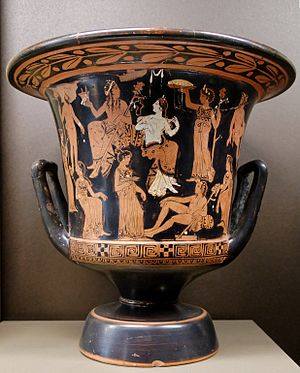Portal:Ancient Greece
Selected articleSince the time of Homer, the Greeks have called themselves Hellenes (Έλληνες), though they have been known by a number of different names throughout history. The soldiers that fell at Thermopylae did so as the last protectors of Hellas. Homer, Herodotus and the later Greek authors locate the first usages of the word "Hellenes" as an ethnic name-umbrella under which the Achaians and the rest of the Greek allies sailed for the city state of Troy under Agamemnon's leadership, although up to that point "Hellas" (Greek: Eλλάς) and "Hellenes" was the name of the tribe (also called "Myrmidones") settled in Thessalic Phthia having Achilles as their leader.Alexander the Great is the first leader who officially uses the terms Hellas and Panhellenic League (league of all Greek tribes except for the Lacedaemonians) when he began his military campaign against the Persian rulers of the Greek city-states of Asia Minor (Ionia) to revenge their ancestors. Selected locationPergamon or Pergamum (Greek: Πέργαμος, modern day Bergama in Turkey, 39°7′N 27°11′E / 39.117°N 27.183°E) was an ancient Greek city, in Mysia, north-western Anatolia, 16 miles from the Aegean Sea, located on a promontory on the north side of the river Caicus (modern day Bakırçay), that became an important kingdom during the Hellenistic period, under the Attalid dynasty, 281–133 BC. Did you know...
Selected picture Photo credit: Jastrow Selected biography Hippocrates of Cos II or Hippokrates of Kos (ca. 460 BC – ca. 370 BC) - Greek: Ἱπποκράτης; Hippokrátēs was an ancient Greek physician of the Age of Pericles, and was considered one of the most outstanding figures in the history of medicine. He is referred to as the "father of medicine" in recognition of his lasting contributions to the field as the founder of the Hippocratic school of medicine. This intellectual school revolutionized medicine in ancient Greece, establishing it as a discipline distinct from other fields that it had traditionally been associated with (notably theurgy and philosophy), thus making medicine a profession.However, the achievements of the writers of the Corpus, the practitioners of Hippocratic medicine, and the actions of Hippocrates himself are often commingled; thus very little is known about what Hippocrates actually thought, wrote and did. Nevertheless, Hippocrates is commonly portrayed as the paragon of the ancient physician.
CategoriesTopics
Places: Aegean Sea · Hellespont · Macedonia · Sparta · Athens · Corinth · Thebes · Thermopylae · Antioch · Alexandria · Pergamon · Miletus · Delphi · Olympia · Troy · Rhodes
Life: Agriculture · Art · Cuisine · Democracy · Economy · Language · Law · Medicine · Paideia · Pederasty · Pottery · Prostitution · Slavery · Technology · Olympic Games Philosophers: Pythagoras · Heraclitus · Parmenides · Protagoras · Empedocles · Democritus · Socrates · Plato · Aristotle · Zeno · Epicurus Authors: Homer · Hesiod · Pindar · Sappho · Aeschylus · Sophocles · Euripides · Aristophanes · Menander · Herodotus · Thucydides · Xenophon · Plutarch · Lucian · Polybius · Aesop Buildings: Parthenon · Temple of Artemis · Acropolis · Ancient Agora · Arch of Hadrian · Temple of Zeus at Olympia · Colossus of Rhodes · Temple of Hephaestus · Samothrace temple complex Chronology: Aegean civilization · Minoan Civilization · Mycenaean civilization · Greek dark ages · Classical Greece · Hellenistic Greece · Roman Greece People of Note: Alexander The Great · Lycurgus · Pericles · Alcibiades · Demosthenes · Themistocles · Archimedes · Hippocrates Art and Sculpture: Kouroi · Korai · Kritios Boy · Doryphoros · Statue of Zeus · Discobolos · Aphrodite of Knidos · Laocoön · Phidias · Euphronios · Polykleitos · Myron · Parthenon Frieze · Praxiteles Related portalsWikiProjectsThings to do
Associated WikimediaThe following Wikimedia Foundation sister projects provide more on this subject:
|















